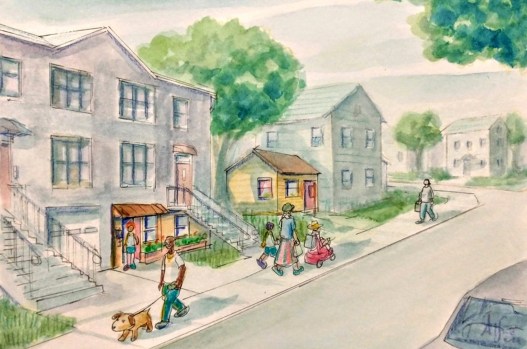
The New York City Department of Housing Preservation and Development (HPD) announced the launch of a new pilot program to help homeowners add an additional small home to their properties as part of the Adams administration’s efforts to build a little more housing in every neighborhood. (NYC.gov)
I run the largest Jewish social-services charity in New York, and the No. 1 request we receive is for help with affordable housing. Unfortunately, there’s a year-long waiting list for our 20 affordable housing buildings because there simply isn’t enough housing to go around. That’s why we need all the solutions we can get. One of the most promising solutions in years is the “City of Yes for Housing Opportunity” proposal from Mayor Adams and City Planning Chair Dan Garodnick.
New York City faces one of the worst housing crises in our lifetimes. Nearly half of New Yorkers struggle to pay rent, and vacancy rates are at a historic low of 1.4%. The “City of Yes” proposal offers a crucial solution — not just more housing, but the creating of new housing that meets the needs of those who need it most: our relatives, our neighbors, and the next generation of New Yorkers.
A key component of this initiative is the legalization of accessory dwelling units (ADUs). These are small, independent residential units, such as new basement apartments, backyard extensions, or even the conversion of garages into small apartments. ADUs offer a simple but practical way to create affordable living spaces without changing the character of New York’s diverse neighborhoods.
For families like mine, ADUs would have been life-changing. When my mother, who spent her life taking care of us, became sick and could no longer navigate the stairs to her second-floor walk-up, it was difficult to find nearby housing that maintained her independence.
If ADUs had been legal, we could have converted our garage, allowing her to stay close to us in her final days — instead we had to opt for an assisted living facility. This is the reality for many families in New York. Whether it’s caring for aging parents or supporting adult children who are living at home, ADUs offer a flexible, affordable option that strengthens family bonds and provides dignity in tough times.
ADUs also provide economic benefits for homeowners. Seniors make up 20% of New York City’s population, and that number is expected to increase by 40% by 2040. More than half a million of these seniors are waiting for affordable housing.
For seniors who are homeowners and on fixed incomes, the rental income from an ADU could help cover daily expenses or medical bills. For young families trying to buy a home in the city, renting out an ADU can make mortgage payments more manageable. In a city where 36% of those who relocated cited high housing costs as the reason, this extra income could be a lifeline.
We’ve already seen ADU success stories in places like California. There, ADUs have helped alleviate housing shortages while preserving the character of neighborhoods. Approximately 29% of ADUs in California have been built for families or friends of the homeowner, helping to keep communities vibrant. ADUs not only empower homeowners but allow seniors to age in the neighborhoods they helped build. It’s an elegant solution that New York should embrace.
New York City is at a critical turning point. The housing shortage isn’t just about numbers; it’s about people. It’s about ensuring that our loved ones have a place to live close to us when they need it most — whether they’re aging parents, recent college graduates, or families just starting out. The “City of Yes” is not just a policy; it’s an opportunity to provide New Yorkers with the homes they need. For my family, this policy would have made a world of difference. For countless others, it still can.
As the largest Jewish nonprofit that owns and operates affordable senior housing, we fully support this initiative. Every day, we see families making heartbreaking decisions due to the lack of affordable housing. Parents must choose between staying close to their children or moving far away to find something they can afford. Young people, raised in this city, are being priced out of their own neighborhoods. We as a city can no longer afford to do nothing while New Yorkers struggle.
By embracing the “City of Yes,” we are not just making more space for housing; we are prioritizing the future of our communities. After today’s City Planning Commission vote, this proposal comes before the City Council. It’s time to say yes to housing, yes to economic opportunity, and yes to a future where everyone — our families, our neighbors, and our newest New Yorkers — has a place to call home.
Greenfield is CEO of the Met Council on Jewish Poverty.
